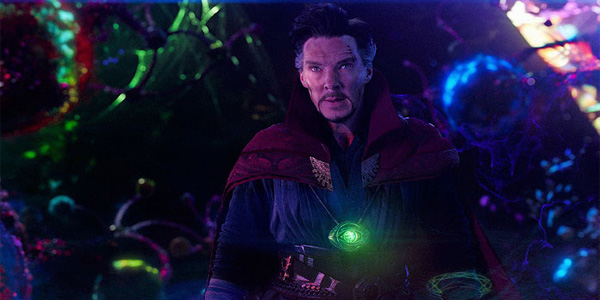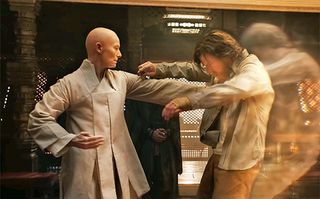Why Doctor Strange Needed To Kill Off (Spoiler)

SPOILER WARNING: The following article contains MASSIVE spoilers for Doctor Strange. If you have not yet seen the film, and don't wish to know any details about it going in, please save this page and click away to another one of our wonderful articles.
While Tilda Swinton proves to be absolutely amazing as The Ancient One in Doctor Strange, the sad truth is that her stay in the Marvel Cinematic Universe is... short-lived. Thanks to a battle with a super-powered Kaecilius in the mirror dimension, The Ancient One winds up taking a great fall in the middle of New York, and sadly the team of emergency room doctors led by Christine Palmer are unable to save her. Given how great Swinton's performance is, it's a sad moment in the movie -- but as co-writer Jon Spaihts recently explained to me, it was a necessary choice in the script. Why? Because the presence of a Sorcerer Supreme naturally has the effect of undermining the abilities of the titular hero.
The subject of The Ancient One's death in Doctor Strange came up when I sat down with Jon Spaihts for an interview earlier this month. We were discussing the importance of "Nerfing" the Eye of Agamotto a bit -- as it's comic book counterpart is far too powerful -- and he explained why the mentality behind that decision was equitable to why he and co-writers Scott Derrickson and C. Robert Cargill needed to kill off Tilda Swinton's character. Said Spaihts,
There's a very strong argument there for taking The Ancient One out of the picture, because The Ancient One was always a problem in Doctor Strange. In theory, as Doctor Strange's teacher, The Ancient One should be at least as mighty, if not slightly mightier - and yet Doctor Strange is always being called upon to rescue and save The Ancient One. [In the comics] he's not a very effective Sorcerer Supreme, that Ancient One!
Jon Spaihts is specifically referencing the early Doctor Strange comics from Stan Lee and Steve Ditko in the early 1960s. In those issues, many of the titular sorcerer's missions involved saving the seemingly-helpless Ancient One from attacks by the mustache-twirling Baron Mordo. In the film adaptation, the choice was made to make Tilda Swinton's The Ancient One anything but helpless -- but that's why she had to go.

To make his argument about killing off The Ancient One clearer, Jon Spaihts went the literary reference route, and compared the narrative/character issue to one that author Madeleine L'Engle had to deal with when writing the beloved novel A Wrinkle In Time. Spaihts explained,
I think of it as the Wrinkle In Time problem, where Meg and Charles go to rescue their father, who is lost in a cosmic world. And then they finally do rescue him, and you instantly have a problem, because either he's 'Dad' and now he's in charge, and these heroes who you've been following are shoved to the back; or he's oddly helpless, and you have 'Emasculated Dad.' And Emasculated Dad isn't good, so that parent story often needs to come out of that story to let the heroes be themselves. And I think The Ancient One is an instance of that.
In Doctor Strange, The Ancient One makes it very clear that her death is a fixed and unchangeable event -- evidenced in her never being able to see a future for herself beyond that specific point -- but we still hold out hope that Tilda Swinton's time in the Marvel Cinematic Universe isn't over. When I spoke with the actress late last month, she seemed very eager to continue to dive into the morality issues the character introduces. Perhaps she could find her way back in an Obi-wan Kenobi/Force Ghost kind of way?
We'll have to wait and see what the future holds for The Ancient One, but for now stay tuned for more of our Doctor Strange coverage here on Cinema Blend.
CINEMABLEND NEWSLETTER
Your Daily Blend of Entertainment News

Eric Eisenberg is the Assistant Managing Editor at CinemaBlend. After graduating Boston University and earning a bachelor’s degree in journalism, he took a part-time job as a staff writer for CinemaBlend, and after six months was offered the opportunity to move to Los Angeles and take on a newly created West Coast Editor position. Over a decade later, he's continuing to advance his interests and expertise. In addition to conducting filmmaker interviews and contributing to the news and feature content of the site, Eric also oversees the Movie Reviews section, writes the the weekend box office report (published Sundays), and is the site's resident Stephen King expert. He has two King-related columns.
Most Popular




